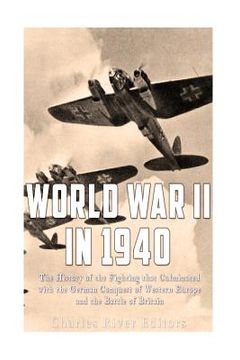World War II in 1940: The History of the Fighting that Culminated with the German Conquest of Western Europe and the Battle of Britain (en Inglés)
Reseña del libro "World War II in 1940: The History of the Fighting that Culminated with the German Conquest of Western Europe and the Battle of Britain (en Inglés)"
*Includes pictures *Includes accounts of the fighting by soldiers on both sides *Includes online resources and a bibliography for further reading One of the most famous people in the world came to tour the city of Paris for the first time on June 28, 1940. Over the next three hours, he rode through the city's streets, stopping to tour L'Opéra Paris. He rode down the Champs-Élysées toward the Trocadero and the Eiffel Tower, where he had his picture taken. After passing through the Arc de Triomphe, he toured the Pantheon and old medieval churches, though he did not manage to see the Louvre or the Palace of Justice. Heading back to the airport, he told his staff, "It was the dream of my life to be permitted to see Paris. I cannot say how happy I am to have that dream fulfilled today." Four years after his tour, Adolf Hitler would order the city's garrison commander, General Dietrich von Choltitz, to destroy Paris, warning his subordinate that the city "must not fall into the enemy's hand except lying in complete debris." Of course, Paris was not destroyed before the Allies liberated it, but it would take more than 4 years for them to wrest control of France from Nazi Germany after they took the country by storm in about a month in 1940. The surrender of more than 1,200,000 isolated troops followed quickly in June 1940, yet in the midst of this disaster, the Allies contrived one coup that took even the victorious Wehrmacht aback: the evacuation of over 300,000 soldiers from the port of Dunkirk. This escape, hailed as "miraculous" at the time, provided England with a solid defensive force, the French with the kernel of a "Free French" army for the future, and the Western Allies with an invaluable boost to their morale during one of the war's darkest moments. Hitler's Order of the Day on June 5th, 1940 placed no special emphasis on the end of the Dunkirk evacuation save as the milestone marking full German triumph in the north. While a leader never celebrates the successes of his enemies, the Fuhrer's terse commentary - and subsequent, very real expectations that the British would sue for peace and possibly even overthrow Churchill - suggest that he attached little significance to the BEF slipping through his fingers: "Soldiers of the West Front! Dunkirk has fallen... with it has ended the greatest battle of world history. Soldiers! My confidence in you knew no bounds. You have not disappointed me." With the clarity of historical hindsight, events proved Churchill correct. Operation Dynamo, as the British named the Dunkirk evacuation mission, bolstered British morale and defenses sufficiently to keep the "Sceptered Isle" in the war. The sacrifice made by "The Few", the British and Allied fighter pilots who won the Battle of Britain in 1940, remains close to the hearts of the British public, and the piece by the BBC is typical of the national sentiment manifested in air shows, museums, TV programs and books. Even as the last of "The Few" pass on, it seems unlikely that the legend they helped to create will be forgotten anytime soon. Thankfully, the RAF stood toe to toe with the Luftwaffe and ensured Hitler's planned invasion was permanently put on hold. The Allied victory in the Battle of Britain inflicted a psychological and physical defeat on the Luftwaffe and Nazi regime at large, and as the last standing bastion of democracy in Europe, Britain would provide the toehold for the June 1944 invasion of Europe that liberated the continent. For those reasons alone, the Battle of Britain was one of the decisive turning points of history's deadliest conflict. World War II in 1940: The History of the Fighting that Culminated with the German Conquest of Western Europe and the Battle of Britain chronicles one of the war's pivotal years, when the fate of the free world hung in the balance.

